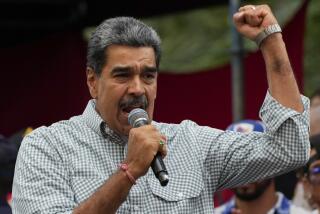Paranoid, for a reason
- Share via
After Venezuelans rejected Hugo Chavez’s attempt to amend the constitution and install himself as president in perpetuity, he vowed nonetheless to concentrate power in his hands. And he has, in predictably socialist ways. On a nationalizing spree, the government is swallowing up telecommunications and electricity industries, energy and steel.
Chavez’s latest move, however, has nothing to do with the redistribution of wealth and everything to do with one man’s paranoia. A new intelligence decree, enacted last week, requires the public to assist the secret police and other organizations with their investigations or face up to four years in prison. Also, wiretapping and other surveillance methods no longer require court orders, and judges and prosecutors must aid intelligence agency investigations. So begins a retro-Soviet system of informants, snitches and operatives -- or maybe Venezuela’s community councils, all loyal to Chavez, will mimic Cuba’s Committees for the Defense of the Revolution.
Perhaps Chavez’s lust for power would have led him to this point regardless of external events. Yet because the intelligence decree is designed to minimize assassination or coup plots and other national security threats, Washington’s culpability in fueling his paranoia cannot be overlooked.
This is how the Bush administration’s failed policy in South America -- sending guns and military equipment while ignoring the desperate poverty of the masses, treating the region’s elected leaders with disdain and, yes, tacitly supporting a 2002 coup attempt against Chavez -- has played out. Instead of agile diplomacy, Washington has delivered blunders, bluster and gaffes that confound diplomatic efforts and exacerbate tensions. The intrusion of a U.S. Navy jet into Venezuela’s airspace is one recent example. Venezuela says the jet was on a spy mission to test whether its presence would be detected; Pentagon officials say it experienced navigational difficulties. What’s certain is that the incident gave credence to Chavez’s allegations of U.S. plotting.
The best course now for Washington is to do nothing. Venezuelans beat back Chavez’s first power grab, defeating his constitutional referendum in December, and there is already vigorous opposition to the intelligence decree. For the U.S. to interfere would only validate Chavez’s suspicions and weaken the opposition.
More to Read
Sign up for Essential California
The most important California stories and recommendations in your inbox every morning.
You may occasionally receive promotional content from the Los Angeles Times.










